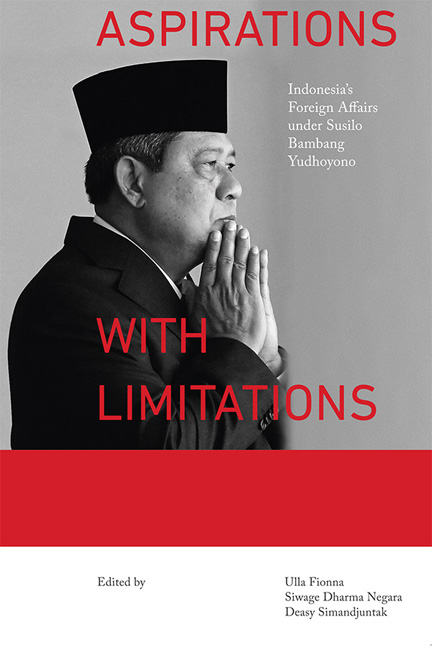Book contents
- Frontmatter
- Contents
- About the Contributors
- 1 Introduction
- 2 Indonesian Foreign Policy: Waging Peace, Stability, and Prosperity
- 3 Indonesia's Diplomatic and Strategic Position under Yudhoyono
- 4 International Economic Cooperation during the Yudhoyono Presidency
- 5 First Term Right, Second Term Shy: A Review of Indonesia's Economic Links with Key Trading Partners
- 6 International Labour Migration: A Very Mixed Blessing
- 7 Law Enforcement, Prevention, and Deradicalization: How SBY Handled Terrorism
- 8 Drifting towards Dynamic Equilibrium: Indonesia's South China Sea Policy under Yudhoyono
- 9 Uneasy Neighbours: Indonesia–Malaysia Relations under Yudhoyono
- 10 A Fair Dinkum Partnership? Australia–Indonesia Ties during the Yudhoyono Era
- 11 The Aceh Peace Process: Wheeling and Dealing behind Closed Doors
- Index
1 - Introduction
Published online by Cambridge University Press: 08 June 2019
- Frontmatter
- Contents
- About the Contributors
- 1 Introduction
- 2 Indonesian Foreign Policy: Waging Peace, Stability, and Prosperity
- 3 Indonesia's Diplomatic and Strategic Position under Yudhoyono
- 4 International Economic Cooperation during the Yudhoyono Presidency
- 5 First Term Right, Second Term Shy: A Review of Indonesia's Economic Links with Key Trading Partners
- 6 International Labour Migration: A Very Mixed Blessing
- 7 Law Enforcement, Prevention, and Deradicalization: How SBY Handled Terrorism
- 8 Drifting towards Dynamic Equilibrium: Indonesia's South China Sea Policy under Yudhoyono
- 9 Uneasy Neighbours: Indonesia–Malaysia Relations under Yudhoyono
- 10 A Fair Dinkum Partnership? Australia–Indonesia Ties during the Yudhoyono Era
- 11 The Aceh Peace Process: Wheeling and Dealing behind Closed Doors
- Index
Summary
As the first directly elected Indonesian president, Susilo Bambang Yudhoyono (SBY) served at a crucial juncture in Indonesia's history. Succeeding the three short presidencies of BJ Habibie, Abdurrahman Wahid and Megawati Sukarnoputri, his presidency had a lot to prove. The initial stage of transition to democracy under these preceding administrations was extremely challenging as state institutions underwent changes, while the elite grappled with the demands from the polity for better governance. The fact that the first three post-reform presidents only served a portion of their terms signifies the uncertainties of a post-authoritarian state and the intense politicking among the political elites. Indeed, succeeding these leaders with a two-term presidency is a testament to SBY's popularity and political flair. With a popularity that was remarkably broad across political parties and demographic groups (Liddle and Mujani 2004, p. 121), much was riding on his first victory in 2004 as voter dissatisfaction towards his predecessor Megawati Sukarnoputri transformed into great hope for his presidency.
Among SBY's many achievements, top of the list is the strengthening of democratic institutions. SBY did so by maintaining overall political stability, while ensuring certain important milestones such as setting up direct elections for local heads (at the province, district and municipal levels) and strengthening the Corruption Eradication Commission (KPK). Overall, he maintained peace and stability, two important conditions for keeping democracy intact and consolidating it. These milestones were particularly important, given that his two-term administration coincided with the country's democratic transition, one of the most crucial periods in Indonesia's history.
Alongside praise, SBY's government has also attracted criticism over his failure to further Indonesia's progress. Specifically, he was responsible for a period of democratic stagnation in Indonesia (see, for example, Tomsa 2010 and Mietzner 2012). As identified by scholars, some important signals of the push against and pull towards democratic institutionalization were the attempts by the elites to roll back the progress of democracy, on the one hand, and civil society's efforts to maintain the process of democratic institutionalization, on the other. Political freedom also started to deteriorate in his second term, with Freedom House downgrading the country's status from “Free” in 2013 to “Partly Free” in 2014, owing mainly to increasing government control over civil organizations.
- Type
- Chapter
- Information
- Aspirations with LimitationsIndonesia's Foreign Affairs under Susilo Bambang Yudhoyono, pp. 1 - 13Publisher: ISEAS–Yusof Ishak InstitutePrint publication year: 2018



